
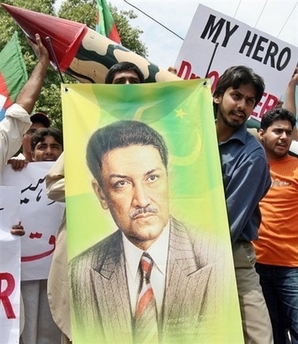 He is old, angry, and suffers from thrombosis and prostate cancer. Yet this sick old man, who trained as a metallurgical engineer, is often described as the most dangerous person on Earth. Father of the "Islamic Bomb," Dr. Abdul Qadeer Khan is a wildly popular figure at home in Pakistan. No less than fifteen academic institutions have been named in his honor there. Several days ago, throngs of adoring fans erupted in joy as Pakistan's High Court declared Khan "a free man" ending his five-year house arrest.
He is old, angry, and suffers from thrombosis and prostate cancer. Yet this sick old man, who trained as a metallurgical engineer, is often described as the most dangerous person on Earth. Father of the "Islamic Bomb," Dr. Abdul Qadeer Khan is a wildly popular figure at home in Pakistan. No less than fifteen academic institutions have been named in his honor there. Several days ago, throngs of adoring fans erupted in joy as Pakistan's High Court declared Khan "a free man" ending his five-year house arrest.
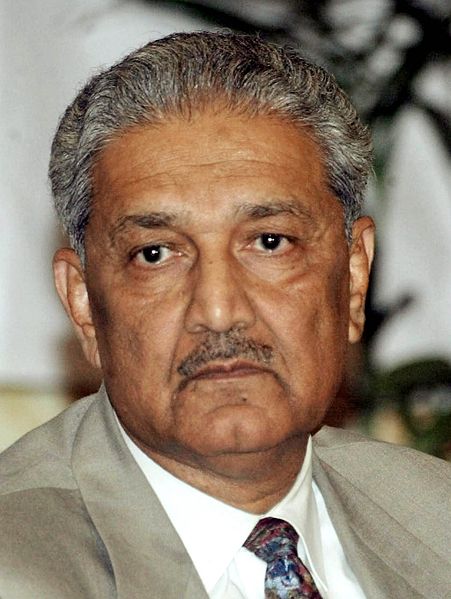 For more than fifteen years, Khan and his international team of scientists and engineers eluded (and at times colluded with) various intelligence agencies in a successful effort to create and detonate Pakistan's atomic bomb. Estimates are that Pakistan now has dozens of nuclear weapons and Khan is portrayed as the savior of his nation against the threat of nuclear blackmail from neighboring India.
For more than fifteen years, Khan and his international team of scientists and engineers eluded (and at times colluded with) various intelligence agencies in a successful effort to create and detonate Pakistan's atomic bomb. Estimates are that Pakistan now has dozens of nuclear weapons and Khan is portrayed as the savior of his nation against the threat of nuclear blackmail from neighboring India.
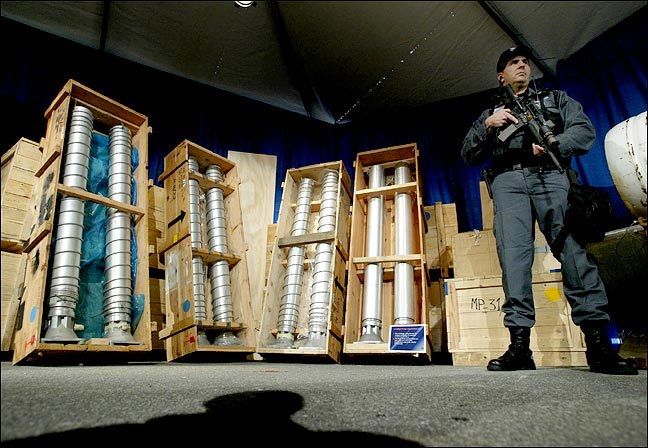 Yet, for most of the world, Dr. Khan is regarded as a reckless and egotistical scientist who widely disseminated nuclear secrets and sold highly restricted equipment. His simple motive: greed. Five years ago, under pressure from Pakistan's former President General Pervez Musharraf, Khan confessed he ran an illicit worldwide nuclear export network. This massive operation trafficked and traded nuclear materials, gas centrifuges, and critical bomb-making blueprints to countries that included North Korea, Libya, and Iran.
Yet, for most of the world, Dr. Khan is regarded as a reckless and egotistical scientist who widely disseminated nuclear secrets and sold highly restricted equipment. His simple motive: greed. Five years ago, under pressure from Pakistan's former President General Pervez Musharraf, Khan confessed he ran an illicit worldwide nuclear export network. This massive operation trafficked and traded nuclear materials, gas centrifuges, and critical bomb-making blueprints to countries that included North Korea, Libya, and Iran.
After the public confession, Musharraf immediately pardoned this "national hero," prohibited him from being questioned, and isolated him under unofficial house-arrest. This frustrated international investigators who sought to unravel how much of the nuclear genie Khan set loose around the world and why several of his key associates had met with Al Qaeda leaders.
Have the Pakistani courts freed the most dangerous man on Earth? At the moment, Dr. Khan is still held closely under guard. His network of agents and collaborators appear to be more carefully monitored now. Might they resume trading in global Armageddon? Possibly. But Dr. Khan remains dangerous. His release and "rehabilitation" trumpets a tragic message to the world that gross scientific misconduct has no adverse consequences. He is lionized at home when logic and justice demand retribution for his reckless proliferation. His irresponsibility endangers all mankind and he remains unrepentant.
When asked just days ago what the international community would think of his release, Khan was unapologetic:
"Are they happy with our God? Are they happy with our prophet? Are they happy with our leader? Never," he said. "I don't care about rest of the world. I care about my country."
Well, I care about the rest of the world. Most scientists and engineers care about it too. The problem is that the relationship between scientists and the world has completely changed. When the 20th century began, scientists and engineers could cause society a modest amount of mischief and harm. Today, the work of a few determined rogue scientists could destroy a significant portion of our world. The release of nuclear, biological, or chemical weapons or the dissemination of radioactive "dirty dust" are probabilities civilization must now actively prepare for.
Significant threats no longer require massive state-sponsorship. With rapid advances in biotechnology and with greater dissemination of weapons research and technology, the ability for unethical scientists to manufacture weapons of mass destruction (WMD) has increased exponentially in the past few years and will continue for the foreseeable future.
Intelligence communities, of course, struggle to identify threats as these scientific capabilities continue to grow. But these agencies have limited scientific resources (especially lacking personnel with sufficient training and specialized knowledge of emerging threats.) They have largely focused their efforts on prominent "rogue" governments and terror organizations. So far, they have had mixed results identifying such threats: (i.e.,: failing to assess the status of chemical and biological weapons in Iraq; failing to discover nuclear weapons research in Syria; failing for years to comprehend the former Soviet Union's enormous biological weapons capabilities, etc.)
Equally troubling is how these intelligence agencies have, in large part, been unsuccessful in early detection of "independent" threats: (i.e., timely tracking of Khan's nuclear network; failing to anticipate the release of nerve gas on Tokyo subways; the lengthy and fumbled investigation into the anthrax attack that shut-down Senate office buildings.)
As destructive technology becomes simpler to develop and deploy, scientists must join the frontlines in the battle to protect the public from those whose intention is to abuse science and cause great harm.
Medical doctors take a Hippocratic Oath: First, Do No Harm. Physicians (and even their patients) understand that those who intentionally cause harm practicing medicine must be sanctioned and punished. Engineering and scientific societies also have established varying codes of ethical standards. In sharp contrast to medical standards, engineers and scientists are first introduced to ethical codes of conduct (if at all) only after reaching post-graduate study. This is too little and way too late.
It is astonishing that clear codes of ethics are not widely subscribed to by scientists. Even where there are ethical codes, no enforcement mechanisms exist to make these meaningful. While scientists with terrorist aspirations are unlikely to be deterred by codes of conduct (no matter how well-defined), having standards widely inculcated in the broad scientific community is likely to deter those on the periphery of such work. Such standards will encourage scientists and engineers with suspicions about unsavory behavior to help uncover potential threats.
Would a code of ethics deter A.Q. Khan? Of course not. But imagine a world in which scientists know they have ethical strictures to abide by. Imagine that even the children of scientists and their neighbors know that great responsibility comes with the territory. It would have been far more difficult for A.Q. Khan's network to have flourished for more than fifteen years, largely avoiding significant scrutiny, if all of his associates, suppliers, and collaborators existed in an ethos where scientific responsibility was clearly understood... and where breaking ethical codes had consequences.
In 1999, Sir Joseph Rotblat, physicist and Nobel laureate, realized that the advances in science required the adoption of codes of responsibility. He wrote,
"Through its technological applications, science has become a dominant element in our lives. It has enormously improved the quality of life. It has also created great perils, threatening the very existence of the human species. Scientists can no longer claim that their work has nothing to do with the welfare of the individual or with state policies."
Rotblat suggested that scientists adopt an oath something like this:
"I promise to work for a better world, where science and technology are used in socially responsible ways. I will not use my education for any purpose intended to harm human beings or the environment. Throughout my career, I will consider the ethical implications of my work before I take action. While the demands placed upon me may be great, I sign this declaration because I recognize that individual responsibility is the first step on the path to peace."
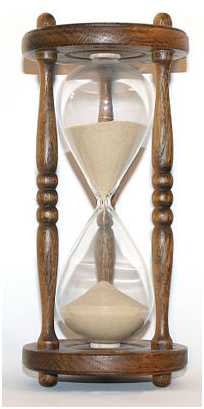 I decided, after years of producing war coverage and reporting on technology and proliferation issues, that I would help scientists become more involved in preventing the spread of WMD s. Tracing the arc of Dr. Khan's sociopathic nuclear enterprise should make it clear to all scientists and engineers that ethical standards are required on the job. These codes of ethics must be spelled out and must be made enforceable. Scientists should have a means of anonymously reporting suspicious and unethical behavior especially regarding the development of WMDs. Journalists, scientists, and investigators should work together to assess such threats. (See The Hourglass Initiative.)
I decided, after years of producing war coverage and reporting on technology and proliferation issues, that I would help scientists become more involved in preventing the spread of WMD s. Tracing the arc of Dr. Khan's sociopathic nuclear enterprise should make it clear to all scientists and engineers that ethical standards are required on the job. These codes of ethics must be spelled out and must be made enforceable. Scientists should have a means of anonymously reporting suspicious and unethical behavior especially regarding the development of WMDs. Journalists, scientists, and investigators should work together to assess such threats. (See The Hourglass Initiative.)
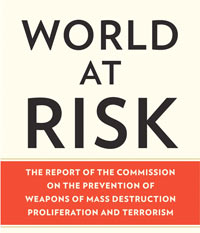 In December 2008, an astonishing study, "World at Risk: The Report of the Commission on the Prevention of Weapons of Mass Destruction Proliferation and Terrorism," chaired by Bob Graham and Jim Talent was released. It detailed "where the risks to the United States are increasing: the crossroads of terrorism and proliferation in the poorly governed parts of Pakistan" and potential methods of preventing biological and nuclear terrorism. Regarding the increasing threat, they quoted Former Secretary of the Navy Richard Danzig who said,
In December 2008, an astonishing study, "World at Risk: The Report of the Commission on the Prevention of Weapons of Mass Destruction Proliferation and Terrorism," chaired by Bob Graham and Jim Talent was released. It detailed "where the risks to the United States are increasing: the crossroads of terrorism and proliferation in the poorly governed parts of Pakistan" and potential methods of preventing biological and nuclear terrorism. Regarding the increasing threat, they quoted Former Secretary of the Navy Richard Danzig who said,
"Only a thin wall of terrorist ignorance and inexperience now protects us."
That thin wall gets thinner by the day as scientists without ethics, like Dr. A.Q. Khan and his henchmen, push the boundaries of technology with disregard of their ethical responsibility and the consequences for all of us. The world indeed is at risk and scientists can be the cause or the cure.